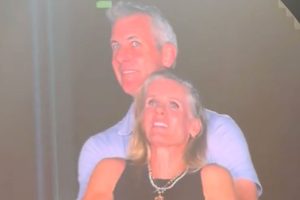For Toronto-based documentarian Daniel Roher, youth is a selling point.
The director of Once Were Brothers: Robbie Robertson and The Band, the film that will open this September’s Toronto International Film Festival (TIFF), Roher is only 26, making him the youngest person ever that can brag about getting that coveted première slot.
But when it came to convincing musician (and fellow Toronto native) Robbie Robertson that Roher was the perfect choice to make a documentary about the Band, the filmmaker campaigned to the guitarist in a language he could understand.
“I really made an effort to hold up a mirror to Robbie and say, ‘This film’s about a young guy who’s in his early 20s, who is trying really hard to make his mark on the world in the art form he was born to do,’” Roher tells The CJN. “And I think he saw something in that.”
That was a big step in the making of Once Were Brothers, which will have its world première at Roy Thomson Hall on Sept. 5. It is also the first Canadian-made documentary to open the festival in its more than 40-year history.
The documentary is also slated to screen theatrically in Toronto, Montreal and Vancouver shortly after the festival, before launching on subscription streaming service Crave in November.
Roher says the Band’s folk rock was a constant in his life since he was a boy, as they were one of the many classic rock acts to which his parents listened.
“I would go on canoe trips with my dad, and we’d sing ‘(Up On) Cripple Creek’ as we were paddling,” Roher says. The music “spoke to me on an emotional level, on a narrative level. There were stories in these songs. ‘The Night They Drove Old Dixie Down’ is like an epic movie told in five minutes.”
Beyond the two aforementioned tunes, Robertson also wrote many of the group’s most enduring songs – including “The Weight,” “Stage Fright” and “Ophelia” – which have reverberated through Canadian radio stations for decades.
Roher found a kindred spirit in Robertson, sharing Toronto roots and an affinity for making art in their late teens and early 20s.
The musician spent a lot of time outside of Toronto on the Six Nations reserve where his mother was born. Roher has made various short films that explore issues that affect indigenous Canadians. His 2015 documentary, Survivors Rowe, which received a Canadian Screen Award nomination, examined several cases of sexual abuse on a First Nations reserve in northern Ontario.
The two men also have Jewish backgrounds, although Robertson never met his father, Alexander Klegerman, who died before the guitarist and musician was born.
“He talked about how his streetwise Jewish family taught (him) about loyalty and ambition and work ethic, and having vision for your own life,” Roher says. “Well, that’s the family I come from, as well.”
“There were these moments where I could see the genetic vestiges of his Jewish heritage in certain expressions or ways he articulated himself.”
Once Were Brothers also focuses on the pivotal years when, as a teenage guitar prodigy, Robertson travelled from Toronto to the American South to be a backing guitarist for Ronnie Hawkins’ band.
But as the film’s title suggests, the documentary is not merely a biography. Roher considers it a moving chronicle of fraternity between five musicians as they made an imprint on rock history.
“These guys really bonded over their music, and they started this family,” Roher says, adding that a good deal of the film’s footage of the Band – much of which comes from the 1960s and ‘70s – has never been viewed publicly.
“When they perform, you can see they’re reading each other’s minds. They’re truly one.”
With the four other members of the Band, Robertson would be present for many iconic moments in rock history, backing Bob Dylan on his infamous “electric” world tour to the group’s final concert in 1976, christened onscreen by director Martin Scorsese as The Last Waltz.
Robertson has also worked frequently with Scorsese, and even composed the musical score for the director’s much-anticipated crime drama The Irishman, set for release on Netflix this fall.
Robertson was also the one who called Roher in late spring, revealing that Once Were Brothers would open the festival.
“TIFF was always our dream,” Roher says, “but we never dreamed that we would be opening the festival. That’s quite a distinguished honour.”






